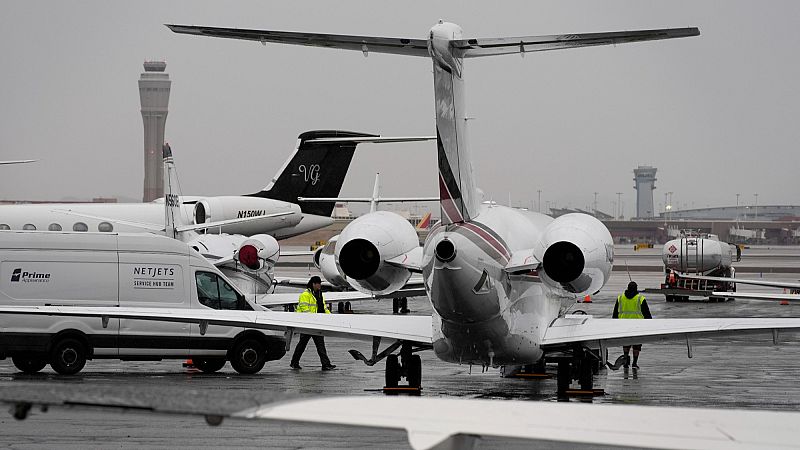
France and Spain have joined a coalition of countries pushing to tax private jets and premium class flights to raise money for climate action and sustainable development.
The two European nations have joined forces with Kenya, Barbados, Somalia, Benin, Sierra Leone and Antigua and Barbuda.
The coalition’s goal is “to increase the number of countries applying taxes on airline tickets, including for luxury travel, and to tax private jets based on best practices,” the French Élysée said in a statement.
The initiative was launched on the sidelines of a United Nations development summit in Seville on 30 June.
How much money could these taxes raise?
A recent study commissioned by the Global Solidarity Levies Task Force estimates that taxing private jet fuel worldwide could generate up to €41 billion annually. Adding levies on first- and business-class tickets could bring in nearly €37 billion more.
Combined, the coalition’s efforts could unlock over €78 billion per year to support climate resilience and sustainable development projects.
The study also suggests that an additional, broader levy on commercial jet fuel could push this total to around €187 billion annually.
New sources of finance
With many richer countries cutting official development aid for poorer nations, some are looking for new sources of finance, including taxing the most polluting industries.
Launched at COP28 in November 2023, the Global Solidarity Levies Task Force was set up to explore new kinds of taxation from polluting sectors that could support developing countries to decarbonise and adapt to the impacts of climate change.
Laurence Tubiana, co-lead of the Global Solidarity Levies Task Force Secretariat, said that new levies on premium flyers could “raise vital funds”.
“In the current context, everybody is pessimistic, saying we cannot do anything. Today’s announcement is proof that we can make progress,” Tubiana added.
French President Emmanuel Macron said at the summit in Seville that after progress had already been made in the shipping industry, this was a “huge step forward” for the aviation sector.
“Having Spain (in our premium flyers coalition) is very good news, and we need more and more countries,” he added.
“We need those that benefited from globalisation to contribute more to financing.”
Macron urged all possible countries to join this "key" international framework.
Why target private jets and premium flights?
Aviation accounts for more than 2.5 per cent of all human-caused greenhouse gas emissions, and it remains one of the sectors with the fastest-growing emissions.
Private jets are especially polluting. In 2023, they emitted an estimated 19.5 million tonnes of greenhouse gases, according to a study by the International Council on Clean Transportation (ICCT) - more than all flights departing London Heathrow that year. Since the COVID-19 pandemic, premium travel has surged. Emissions from private aviation rose by 46 per cent between 2019 and 2023.
Premium cabins, including first and business class, have larger seats and more legroom, which means fewer passengers share the emissions from each flight. This drives up the per-passenger carbon footprint dramatically.
As a result, first and business class travellers produce up to 3 to 4 times more CO2 per kilometre than those flying economy.
“Flying is the most elite and polluting form of travel, so this is an important step towards ensuring that the binge users of this undertaxed sector are made to pay their fair share,” says Rebecca Newsom, global political lead for Greenpeace International’s Stop Drilling Start Paying campaign.
A global survey by Greenpeace and Oxfam found that three out of four people support extra taxes on premium flyers because of their outsized impact on the climate.







